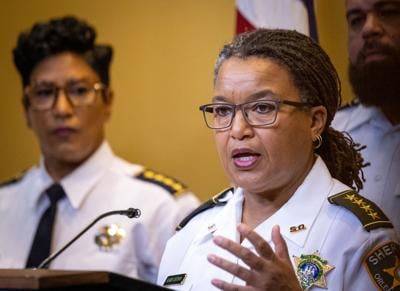New Orleans on Saturday delivered a nearly unanimous rejection of a proposal from Orleans Parish Sheriff Susan Hutson to nearly double a tax her office collects, the latest in a series of setbacks for Hutson that comes almost a year to the day she was inaugurated in 2022 under a promise to reform the troubled jail she oversees.
With all votes counted, Hutson’s proposal to raise the sheriff's tax rate from 2.8 to 5.5 mills received just 9% of the vote, with 91% against.
The margin of failure was unprecedented in the city's modern history.
Overall turnout was expected to be low, given the limited ballot, the heavy rainfall in the afternoon and other distractions, like Jazzfest. And it was: Fewer than 40,000 people voted, for a turnout of around 14%.
In the only other New Orleans race Saturday, Simone Levine defeated Leon Roche by a 51-49 margin for an open seat on the Orleans Parish Criminal District Court bench. Levine won by just over 800 votes.
In a statement issued late Saturday, Hutson said the result "in no way diminishes the financial needs of the Orleans Parish Sheriff’s Office," which she said will need additional funding.
"We must provide competitive pay for our deputies, fix a broken jail that is dangerous for residents and staff and improve our IT infrastructure to better be able show the public what is happening inside the jail," the statement said. "While we did not succeed in making our case to voters, we want the community to know the men and women of the Orleans Parish Sheriff’s Office are dedicated to this community. ... To the OPSO family, please know that I will continue fighting for you every chance I get."
Hutson’s proposal was considered a longshot, both because it came in the wake of a string of controversies involving her office, and because her campaign to persuade voters appeared disorganized and was late to launch.
A spokesperson said Hutson ramped up her efforts in the last two weeks, with the sheriff pitching her proposal at at least five community forums and making appearances at a dozen other events. She also did a round of TV and radio interviews.
Her proposal faced widespread opposition, with “No New Taxes” yard signs cropping up around the city and at least one anti-millage mailer distributed by Keep New Orleans Moving Forward, a political action committee funded by the Business Council of New Orleans.
The back-and-forth came after New Orleans City Council members criticized Hutson for not being more forthcoming about the proposal in a budget hearing earlier this month and for not providing more details of how she’d spend nearly $12 million in additional annual funding, on top of the $12.1 million a year her office already collects in taxes. (The office has an overall budget of about $78 million.)
Of that total of roughly $24 million, Hutson had earmarked about $11.7 million for pay raises and employee benefits. She also said the additional funds are needed to come into compliance with the city's decade-old federal consent decree, which covers the jail, though federal officials didn't call for the millage increase.
When asked during the council hearing for details of how the rest of money would be spent, Hutson said she’d provide a more detailed list by the end of the day.
She never did, Councilmember Joe Giarrusso said.
“We didn’t get an answer,” Giarrusso said in an interview last week. “And we still don’t have an answer.”
In an April 19 report from the independent Bureau of Governmental Research, the policy group — which opposed Hutson’s plan — said Hutson still hadn’t explained how she plans to spend a third of the money. Nor did she disclose who exactly will get raises, or how they’ll be structured.
Being clear about the specifics is critical to any millage proposal, said Silas Lee, political strategist and sociology professor at Xavier University. “Voters do not understand abstractions,” he said.
Prior to Saturday’s vote, Hutson had been dogged by controversy stemming from her decision to put up several of her top deputies in local hotel rooms during Mardi Gras. Last month, she fired four top deputies, including the chief financial officer who said he was investigating possible improprieties of that decision.
The federal judge overseeing the consent decree has also criticized Hutson for not disclosing more information about a wave of violence at the jail last year.
The spate of bad press made it even more important for Hutson to present a detailed plan, Lee said.
“That does not just cloud perception, but — more importantly — trust,” Lee said. “It’s not just supporting the millage. It’s the trust and confidence that the funds are being used for what they’re supposed to be dedicated for.”
Taxpayers will have to cover the costs of Hutson’s millage election, which was estimated at around $475,000. Hutson spokesperson Casey McGee said the actual cost wouldn’t be determined until after the election, and that it’s likely far lower because the initial estimate didn’t account for any other items being on the ballot.
Previous millage increases from the city — or by other sheriffs — have had the benefit of robust public outreach that resembled other political campaigns, which included garnering endorsements from local stakeholders, installing yard signs and paying for advertising.
Hutson largely didn’t begin campaigning for her millage increase until a little more than two weeks ago. She has maintained the issues she inherited with the jail are no secret, and that she’s discussed the need for more funding for months.
In the fall, the council rejected Hutson’s request for $13 million in additional funding, though the council did agree to $2.43-an-hour raises for deputies.
“I’ve talked about this from Day One,” Hutson told the council during the April 13 budget hearing.
Editor's note: This story was updated April 30 to include a statement from Sheriff Susan Hutson.

